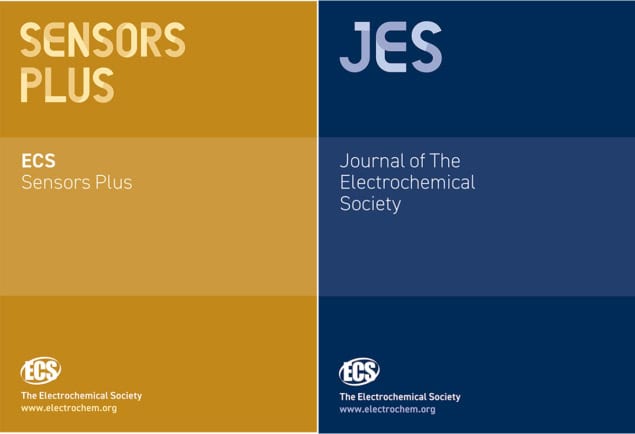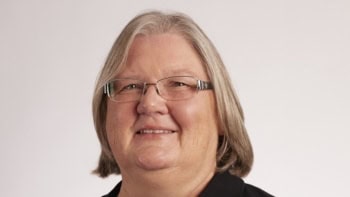Trisha Andrew, Thierry Brousse, Robert Savinell and Weiran Zheng discuss their experience publishing in Electrochemical Society journals

The Electrochemical Society (ECS) is an international non-profit scholarly organization that promotes research, education and technological innovation in electrochemistry, solid-state science and related fields.
Founded in 1902, the ECS brings together scientists and engineers to share knowledge and advance electrochemical technologies.
As part of that mission, the society publishes several journals including the flagship Journal of the Electrochemical Society (JES), which is over 120 years old and covers a wide range of topics in electrochemical science and engineering.
Someone who has seen their involvement with the ECS and ECS journals increase over their career is chemist Trisha Andrew from the University of Massachusetts Amherst. She directs the wearable electronics lab, a multi-disciplinary research team that produces garment-integrated technologies using reactive vapor deposition.

Her involvement with the ECS began when she was invited by the editor-in-chief of ECS Sensors Plus to act as a referee for the journal. Andrew found the depth and practical application of the papers she reviewed interesting and of high quality. This resulted in her submitting her own work to ECS journals and she later became an associate editor for both ECS Sensors Plus and JES.
Professional Opportunities
Physical chemist Weiran Zheng from the Guangdong Technion – Israel Institute of Technology China, meanwhile, says that due to the reputation of ECS journals, they have been his “go-to” place to publish since graduate school.

One of his papers entitled “Python for electrochemistry: a free an all-in-one toolset” (ECS Adv. 2 040502) has been downloaded over 8000 times and is currently the most-read ECS Advances article. This led to an invitation to deliver an ECS webinar — Introducing Python for Electrochemistry Research. “I never expected such an impact when the paper was accepted, and none of this would be possible without the platform offered by ECS journals,” adds Zheng.
Publishing in ECS journals has helped Zheng’s career advance through new connections and becoming more involved with ECS activities. This has not only boosted his research but also professional network and given these benefits, Zheng plans to continue to publish his latest findings in ECS journals.
Highly cited papers
Battery researcher Thierry Brousse from Nantes University in France, came to electrochemistry later on in his career having first carried out a PhD in high-temperature superconducting thin films at the University of Caen Normandy.

When he began working in the field he collaborated with the chemist Donald Schleich from Polytech Nantes, who was an ECS member. It was then that he began to read the JES finding it a prestigious platform for his research in supercapacitors and microdevices for energy storage. “Most of the inspiring scientific papers I was reading at that time were from JES,” notes Brousse. “Naturally, my first papers were then submitted to this journal.”
Brousse says that publishing in ECS journals has provided him with new collaborations as well as invitations to speak at major conferences. He emphasizes the importance of innovative work and the positive impact of publishing in ECS journals where some of his most cited work has been published.
Brousse, who is an associate editor for JES, adds that he particularly values how publishing with ECS journals fosters a quick integration into specific research communities. This, he says, has been instrumental in advancing his career.
Long-standing relationships
Robert Savinell’s relationship with the ECS and ECS journals began during his PhD research in electrochemistry, which he carried out at the University of Pittsburgh. Now at Case Western Reserve University in Cleveland, Ohio, his research focusses on developing a flow battery for low-cost long duration energy storage primarily using iron and water. It is designed to improve the efficiency of the power grid and accelerate the addition of solar and wind power supplies.

Savinell also leads a Department of Energy funded Emerging Frontier Research Center on Breakthrough Electrolytes for Energy Storage. This Center focuses on fundamental research on nano to meso-scale structured electrolytes for energy storage.
ECS journals have been a cornerstone of his professional career, providing a platform for his research and fostering valuable professional connections. “Some of my research published in JES many years ago are still cited today,” says Savinell.
Savinell’s contributions to the ECS community have been recognized through various roles, including being elected a fellow of the ECS and he has previously served as chair of the ECS’s electrolytic and electrochemical engineering division. He was editor-in-chief of JES for the past decade and most recently was elected third vice president of the ECS.
Savinell says that the connections he has made through ECS have been significant, ranging from funding programme managers to personal friends. “My whole professional career has been focused around ECS,” he says, adding that he aims to continue to publish in ECS journals and hopes that his work will inspire solutions to some of society’s biggest problems.
Personal touch
For many researchers in the field, publishing in ECS journals has brought with it several benefits. That includes the high level of engagement and the personal touch within the ECS community and also the promotional support ECS provides for published work.
The ECS journals’ broad portfolio also ensure that researcher’s work reaches the right audience, and such a visibility and engagement is a significant factor when it comes to advancing the careers of scientists. “The difference between ECS journals is the amount of engagement, views and reception that you receive,” says Andrew. “That’s what I found to be the most unique”.


